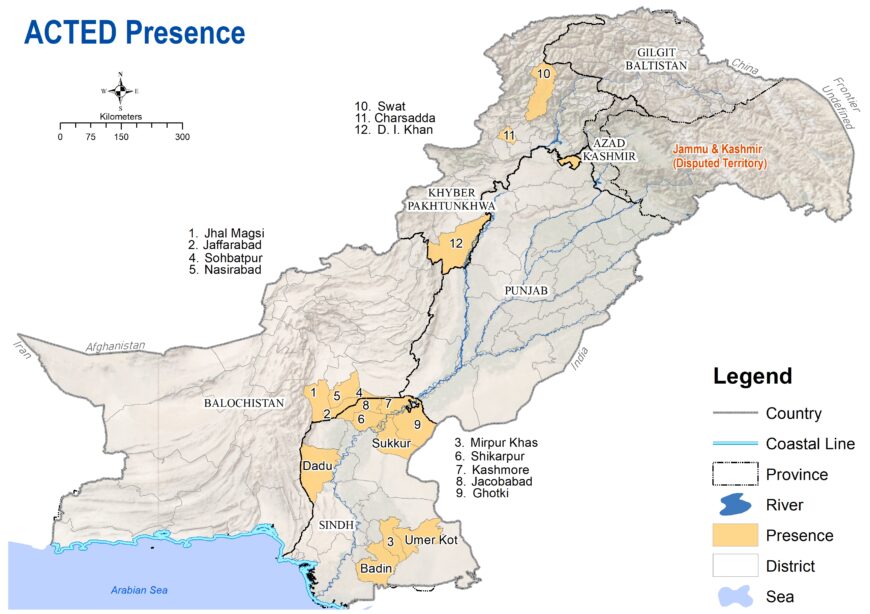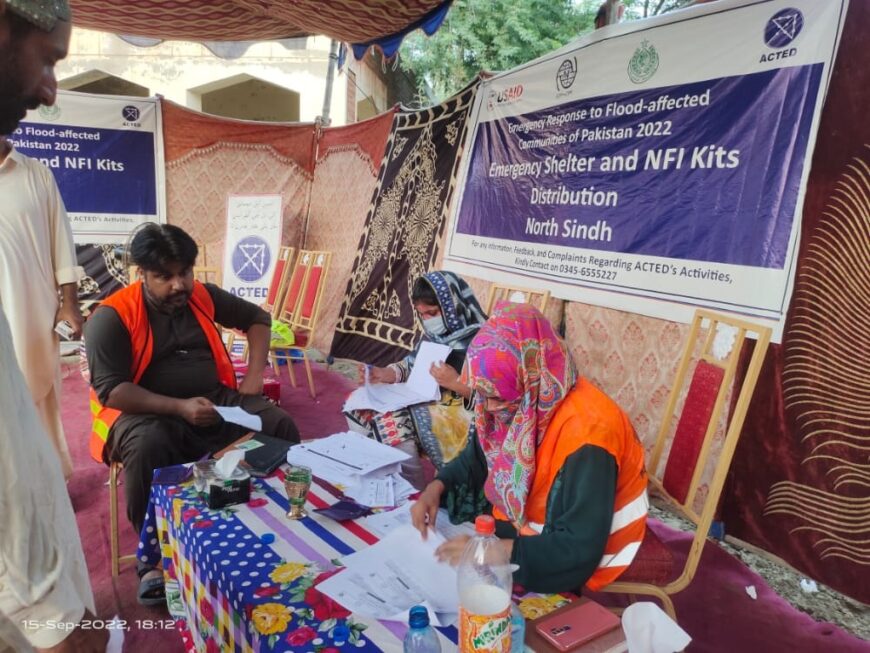The Monsoon flooding of 2022 has caused catastrophic destruction and affected all the provinces and regions of Pakistan. This climate change induced disaster is marked as one of the most catastrophic natural disasters Pakistan has ever endured, and has raised urgent humanitarian needs nationwide. Sindh and Balochistan provinces are currently the most affected provinces, the situation of Punjab and Khyber Pakhtunkhwa is also alarming.
Out of the 116 affected districts, the Government of Pakistan declared 84 districts as ‘calamity hit’. According to UNOCHA, 33 million people have been affected by the crisis. From the loss of lives, to significant damage to people’s livelihoods, to increased protection concerns and the emergence of hazardous water-borne diseases, these floods continue to exacerbate existing inequalities in the country.
Consequences of the flooding
- 1,718 deaths
- 12,800 people injured
- 8 million people displaced
- 640,000 people found refuge in relief camps
- 1 million houses damaged or destroyed
Despite its very low carbon footprint, Pakistan is globally one of the ten countries most affected by extreme weather events, according to the Global Climate Risk Index 2021 and Climate Watch.
In response to the flood emergency in Pakistan, ACTED has been providing humanitarian assistance for the affected population since June 2022. So far ACTED has reached approximately 630,000 individuals in 17 districts of Pakistan focusing a major portion of its relief efforts on the two badly flood-affected provinces of the country, Sindh and Baluchistan.
ACTED in Pakistan
ACTED has eight operational offices in Pakistan:
- In Sindh: Sukkur, Kandkot, Jaccobabad, Mirpurkhas, Umerkot, Sanghar
- In Balochistan: Naseerabad, Usta Muhammad
- In Khyber Pahtunkhwa: in Pehsawar and presently working in partnersip with local organisations

ACTED has been providing humanitarian assistance and supporting development opportunities in Pakistan since 2007. Due to its long-term presence and wide implantation, ACTED has been responding to each major emergency in Pakistan and therefore is considered as a leading humanitarian actor in the country.
Key figures
Sectors of intervention
- Emergency Response
- Disaster Risk Reduction
- Food security and livelihoods
- Shelter and non food items
- Water Sanitation and Hygiene
ACTED’s Resilient Recovery Response Plan
In response to the ongoing flood emergency in Pakistan along with the ongoing emergency response, ACTED is majorly focusing on boosting community resilience to the immediate impacts of climate induced natural disasters as well as making sustainable contributions in terms of building long-term resilience.

Buidling capacity on climate-induced disaster risk reduction
Following the emergency response, ACTED will be rolling out its early recovery strategy focusing on three main pillars:
- Restoration of livelihoods and small businesses/jobs (agriculture inputs, agricultural training, cash grants, business grants, livestock management etc.)
- Recovery and reconstruction of infrastructure and assets (rehabilitation/ repair of WASH infrastructure, repair/ reconstruction of Institutions, roads, bridges, vector control, solid waste management etc.)
- Strengthening stakeholder capacity for reconstruction, especially communities (community training on build back safer shelters – repair of partially damaged Shelters through cash grants, reconstruction of fully damaged shelters, and beneficiary driven approach for capacity building on developing systemic resilience against natural hazards and climate change impacts).
Furthermore, ACTED is carrying out capacity-building initiatives alongside the emergency response, on climate-induced disaster risk reduction. Some of the key capacity-building activities are:
- Community members being oriented in 17 districts of Pakistan on the construction of safe and durable shelters,
- Local masons being trained on ‘built back safer’ techniques, usage of eco-friendly material for the construction (i.e. Bamboo)
- Promoting the efficient utilization of resources etc.
ACTED’s programmatic interventions prior to the monsoon floods of June 2022 aimed to mitigate the impact of the current climate crisis. In addition, some of the previously implemented projects also included components to build resilience among disaster-prone communities such as the Capacity building of communities on climate-smart agricultural techniques, which is and will be of substantial use to affected communities in the coming months.